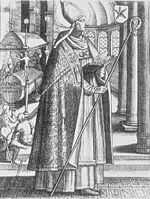Saint Perpetuus
| Saint Perpetuus | |
|---|---|
 | |
| Bishop and Confessor | |
| Died | December 30, 490 AD |
| Honored in | Roman Catholic Church |
| Feast | April 8 |
| Attributes | Depicted as a Bishop directing the building of a church. Sometimes the sick may be shown being healed at his tomb or as his relics are carried in procession. |
Saint Perpetuus (French: Saint-Perpetue) (died December 30, 490 AD) was the sixth Bishop of Tours, from 460 to 490. He succeeded his relative, probably an uncle, Eustochius, and was succeeded by another close relative, Saint Volusianus.
Born of a senatorial family, he became bishop of Tours around 460. It is said of him that he dedicated the revenues of his estates to the relief of those in need.
Appointed about 460, he guided the Church of Tours for thirty years, and it is apparent, from what little information we have, that during his administration Christianity was considerably developed and consolidated in Touraine. Shortly after his elevation, St. Perpetuus presided at a council in which eight bishops who were reunited in Tours on the Feast of St. Martin had participated, and at this assembly an important rule was promulgated relative to ecclesiastical discipline. He maintained a careful surveillance over the conduct of the clergy of his diocese, and mention is made of priests who were removed from their office because they had proved unworthy.
He built monasteries and various churches, but above all he desired to replace by a beautiful basilica (470) the little chapel that Saint Britius had constructed, to protect the tomb of St. Martin of Tours. He is noted for his great veneration for St. Martin and enlarged the place to accommodate the influx of pilgrims to the saint's tomb.
St. Gregory of Tours states that Perpetuus decreed that all of the members of his diocese should fast on Wednesdays and Fridays, except for a few church festivals. He set aside several Mondays as fasts as well, especially in the period of the Christian year that became Advent. These fasts were still being celebrated in the 7th century.
Perpetuus' Will
The will of St. Perpetuus was published for the first time in 1661 by Dom Luc d'Achery in his Spicilegium. This will, an apparent forgery, names the poor as his heirs: "You, my dearly beloved brothers, my crown, my joy, that is to say, Christ's poor, needy, beggars, sick, widows, and orphans, you I hereby name and decree to be my heirs."[1] St. Perpetuus left them all pastures, groves, vineyards, houses, gardens, water-mills, gold, silver, and his own clothing.
Notes
References
External links
- (English) Saint Patrick's Saint Index: April 8 - St.Perpetuus
- (English) Catholic Encyclopedia: St. Perpetuus